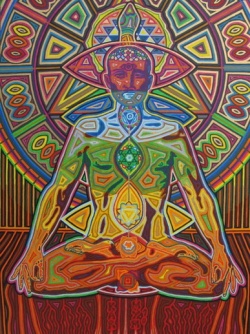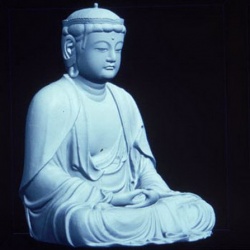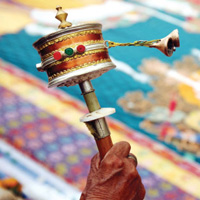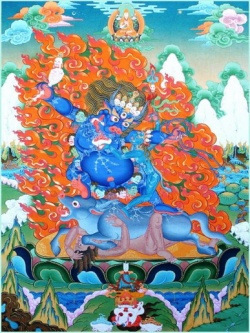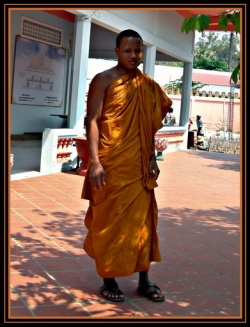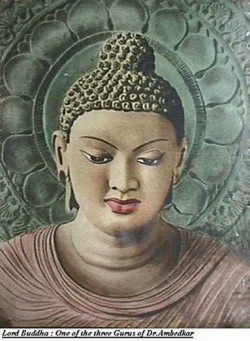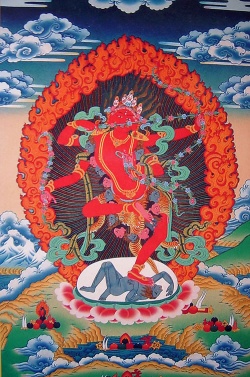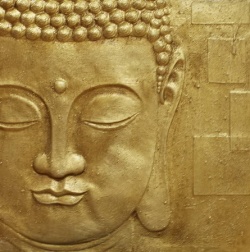Difference between revisions of "Buddha's Last Days and Final Words"
m (Text replacement - "]]]" to "]])") |
|||
| Line 1: | Line 1: | ||
{{DisplayImages|2912|313|1291|615|1026|425|2227|2269|1538|80|1934}} | {{DisplayImages|2912|313|1291|615|1026|425|2227|2269|1538|80|1934}} | ||
| + | |||
| + | |||
| + | |||
| + | |||
| + | |||
| + | |||
<poem> | <poem> | ||
| − | However [[disciples]], when I pass away, you may think," the [[Master's]] [[doctrine]] is gone and the [[Master]] is no more." You should not think so because the [[Dharma]] and the [[Discipline]], which I have [[taught]] you, will be your [[Master]] after my [[death]]. "Let the [[Dharma]] be your {{Wiki|light}}. Let It be your [[refuge]]. Do not seek any other [[refuge]]. "[[Disciples]], you should well {{Wiki|protect}} and preserve the [[doctrine]] which I advised you to probe so that this {{Wiki|holy}} [[life]] may take its course and continue for ages to come for the {{Wiki|welfare}} of many, to console the [[world]], and for the [[happiness]] and {{Wiki|welfare}} of the [[heavenly beings]] and men." | + | |
| + | However [[disciples]], when I pass away, you may think," the [[Master's]] [[doctrine]] is gone and the [[Master]] is no more." You should not think so because the [[Dharma]] and the [[Discipline]], which I have [[taught]] you, will be your [[Master]] after my [[death]]. "Let the [[Dharma]] be your {{Wiki|light}}. Let It be your [[refuge]]. Do not seek any other [[refuge]]. "[[Disciples]], you should well | ||
| + | |||
| + | {{Wiki|protect}} and preserve the [[doctrine]] which I advised you to probe so that this {{Wiki|holy}} [[life]] may take its course and continue for ages to come for the {{Wiki|welfare}} of many, to console the [[world]], and for the [[happiness]] and {{Wiki|welfare}} of the [[heavenly beings]] and men." | ||
[[Ananda]] notices that the [[Buddha]] is growing old | [[Ananda]] notices that the [[Buddha]] is growing old | ||
| Line 17: | Line 26: | ||
"And how, [[Ananda]], is a [[bhikkhu]] an [[island]] unto himself, a [[refuge]] unto himself, seeking no external [[refuge]]; with the [[Dhamma]] as his [[island]], the [[Dhamma]] as his [[refuge]], seeking no other [[refuge]]? | "And how, [[Ananda]], is a [[bhikkhu]] an [[island]] unto himself, a [[refuge]] unto himself, seeking no external [[refuge]]; with the [[Dhamma]] as his [[island]], the [[Dhamma]] as his [[refuge]], seeking no other [[refuge]]? | ||
| − | "When he dwells contemplating the [[body]] in the [[body]], earnestly, clearly comprehending, and mindfully, after having overcome [[desire]] and [[sorrow]] in regard to the [[world]]; when he dwells contemplating [[feelings]] in [[feelings]], the [[mind]] in the [[mind]], and [[mental objects]] in [[mental objects]], earnestly, clearly comprehending, and mindfully, after having overcome [[desire]] and [[sorrow]] in regard to the [[world]], then, truly, he is an [[island]] unto himself, a [[refuge]] unto himself, seeking no external [[refuge]]; having the [[Dhamma]] as his [[island]], the [[Dhamma]] as his [[refuge]], seeking no other [[refuge]]." — DN 16 | + | "When he dwells [[contemplating]] the [[body]] in the [[body]], earnestly, clearly comprehending, and mindfully, after having overcome [[desire]] and [[sorrow]] in regard to the [[world]]; when he dwells [[contemplating]] [[feelings]] in [[feelings]], the [[mind]] in the [[mind]], and [[mental objects]] in [[mental objects]], earnestly, clearly comprehending, and mindfully, after having overcome [[desire]] and [[sorrow]] in regard to the [[world]], then, truly, he is an [[island]] unto himself, a [[refuge]] unto himself, seeking no external [[refuge]]; having the [[Dhamma]] as his [[island]], the [[Dhamma]] as his [[refuge]], seeking no other [[refuge]]." — DN 16 |
He renounces his will to live on | He renounces his will to live on | ||
| Line 45: | Line 54: | ||
He retires to his death-bed | He retires to his death-bed | ||
| − | Then the [[Blessed One]] with a large [[community of monks]] went to the far shore of the Hiraññavati [[River]] and headed for Upavattana, the Mallans' sal-grove near [[Kusinara]]. On arrival, he said to Ven. [[Ananda]], "[[Ananda]], please prepare a bed for me between the twin sal-trees, with its head to the [[north]]. I am tired, and will lie down." | + | Then the [[Blessed One]] with a large [[community of monks]] went to the far shore of the [[Hiraññavati]] [[River]] and headed for [[Upavattana]], the Mallans' sal-grove near [[Kusinara]]. On arrival, he said to Ven. [[Ananda]], "[[Ananda]], please prepare a bed for me between the twin sal-trees, with its head to the [[north]]. I am tired, and will lie down." |
Responding, "As you say, [[lord]]," Ven. [[Ananda]] prepared a bed between the twin sal-trees, with its head to the [[north]]. Then the [[Blessed One]] lay down on his right side in the lion's [[sleeping]] [[posture]], with one foot on top of the other, [[mindful]] & alert. | Responding, "As you say, [[lord]]," Ven. [[Ananda]] prepared a bed between the twin sal-trees, with its head to the [[north]]. Then the [[Blessed One]] lay down on his right side in the lion's [[sleeping]] [[posture]], with one foot on top of the other, [[mindful]] & alert. | ||
| Line 57: | Line 66: | ||
Now at that [[time]] the [[Kusinara]] Mallans had met for some business in their assembly hall. Ven. [[Ananda]] went to the assembly hall and on arrival announced to them, "Tonight, Vasitthas, in the last watch of the night, the total Unbinding of the [[Tathagata]] will occur. Come out, Vasitthas! Come out, Vasitthas! Don't later [[regret]] that 'The [[Tathagata's]] total Unbinding occurred within the borders of our very [[own]] town, but we didn't get to see him in his final hour!'" When they heard Ven. [[Ananda]], the Mallans together with their sons, daughters, & wives were shocked, saddened, their [[minds]] overflowing with [[sorrow]]. Some of them wept, tearing at their [[hair]]; they wept, uplifting their arms. As if their feet were cut out from under them, they fell down and rolled back & forth, crying, "All too soon, the [[Blessed One]] will be totally unbound! All too soon, the One Well-gone will be totally unbound! All too soon, the One with [[Eyes]] will disappear from the [[world]]!" | Now at that [[time]] the [[Kusinara]] Mallans had met for some business in their assembly hall. Ven. [[Ananda]] went to the assembly hall and on arrival announced to them, "Tonight, Vasitthas, in the last watch of the night, the total Unbinding of the [[Tathagata]] will occur. Come out, Vasitthas! Come out, Vasitthas! Don't later [[regret]] that 'The [[Tathagata's]] total Unbinding occurred within the borders of our very [[own]] town, but we didn't get to see him in his final hour!'" When they heard Ven. [[Ananda]], the Mallans together with their sons, daughters, & wives were shocked, saddened, their [[minds]] overflowing with [[sorrow]]. Some of them wept, tearing at their [[hair]]; they wept, uplifting their arms. As if their feet were cut out from under them, they fell down and rolled back & forth, crying, "All too soon, the [[Blessed One]] will be totally unbound! All too soon, the One Well-gone will be totally unbound! All too soon, the One with [[Eyes]] will disappear from the [[world]]!" | ||
| − | Then the Mallans together with their sons, daughters, & wives — shocked, saddened, their [[minds]] overflowing with [[sorrow]] — went to Ven. [[Ananda]] at Upavattana, the Mallans' sal-grove near [[Kusinara]]. — DN 16 | + | Then the Mallans together with their sons, daughters, & wives — shocked, saddened, their [[minds]] overflowing with [[sorrow]] — went to Ven. [[Ananda]] at [[Upavattana]], the Mallans' sal-grove near [[Kusinara]]. — DN 16 |
As long as the [[noble]] [[Eightfold Path]] is practiced, there will be [[arahants]] | As long as the [[noble]] [[Eightfold Path]] is practiced, there will be [[arahants]] | ||
| Line 78: | Line 87: | ||
1. In his final words to his [[disciples]] under the [[sala trees]], the [[Buddha]] uttered these words: "Make my [[teaching]] your {{Wiki|light}}! Rely upon it; do not depend upon any other [[teaching]]. Make of yourself a {{Wiki|light}}. Rely upon yourself; do not depend upon anyone else." "Consider your [[body]]; think of its [[impurity]]; how can you indulge its [[cravings]] as you see that both its [[pain]] and [[delight]] are alike [[causes of suffering]]? Consider your [[soul]]; think of its transiency; how can you fall into [[delusion]] about it and cherish [[pride]] and [[selfishness]], [[knowing]] that they must all end in inevitable suffereing? Consider all {{Wiki|substances}}; can you find among them any enduring '[[self]]'? Are they not all [[aggregates]] that sooner or later will break apart and be scattered? Do not be confused by the universality of [[suffering]], but follow my [[teaching]] and you will be rid of [[pain]]. Do this and you will indeed be my discples." | 1. In his final words to his [[disciples]] under the [[sala trees]], the [[Buddha]] uttered these words: "Make my [[teaching]] your {{Wiki|light}}! Rely upon it; do not depend upon any other [[teaching]]. Make of yourself a {{Wiki|light}}. Rely upon yourself; do not depend upon anyone else." "Consider your [[body]]; think of its [[impurity]]; how can you indulge its [[cravings]] as you see that both its [[pain]] and [[delight]] are alike [[causes of suffering]]? Consider your [[soul]]; think of its transiency; how can you fall into [[delusion]] about it and cherish [[pride]] and [[selfishness]], [[knowing]] that they must all end in inevitable suffereing? Consider all {{Wiki|substances}}; can you find among them any enduring '[[self]]'? Are they not all [[aggregates]] that sooner or later will break apart and be scattered? Do not be confused by the universality of [[suffering]], but follow my [[teaching]] and you will be rid of [[pain]]. Do this and you will indeed be my discples." | ||
| − | 2. "My [[disciples]]. The teachings that I have given you are never to be forgotten nor abandoned. They are to be treasured, they are to be [[thought]] about, they are to be practiced! If you follow these teachings you will always be [[happy]]." "The point of the teachings is to control your [[own]] [[mind]]. Restrain your [[mind]] from [[greed]], so shall you keep your [[body]] right, your [[mind]] [[pure]], your words faithful. Always [[thinking]] of the transiency of your [[life]], you will be able to desist from [[greed]] and [[anger]] and will be able to keep clear from all [[evil]]. "If you find your [[mind]] entangled in [[greed]] and tempted, you must suppress the [[greed]] and control the entangled [[mind]]; be the [[master]] of your [[own]] [[mind]]. A man's [[mind]] may make of him a [[Buddha]], or it may make of him a beast. Being misled by error one becomes a {{Wiki|demon}}; being [[enlightened one]] becomes a [[Buddha]]. Therefore keep your [[mind]] under control and do not let it deviate from the [[Noble Path]]." | + | 2. "My [[disciples]]. The teachings that I have given you are never to be forgotten nor abandoned. They are to be treasured, they are to be [[thought]] about, they are to be practiced! If you follow these teachings you will always be [[happy]]." "The point of the teachings is to control your [[own]] [[mind]]. Restrain your [[mind]] from [[greed]], so shall you keep your [[body]] right, your [[mind]] [[pure]], your words [[faithful]]. Always [[thinking]] of the transiency of your [[life]], you will be able to desist from [[greed]] and [[anger]] and will be able to keep clear from all [[evil]]. "If you find your [[mind]] entangled in [[greed]] and tempted, you must suppress the [[greed]] and control the entangled [[mind]]; be the [[master]] of your [[own]] [[mind]]. A man's [[mind]] may make of him a [[Buddha]], or it may make of him a beast. Being misled by error one becomes a {{Wiki|demon}}; being [[enlightened one]] becomes a [[Buddha]]. Therefore keep your [[mind]] under control and do not let it deviate from the [[Noble Path]]." |
3. "Under my teachings, brothers should [[respect]] each other and refrain from [[disputes]]; they should not repel each other like [[water]] and oil, but should mingle together like milk and [[water]]. Study together, learn together, [[practice]] the teachings together. Do not waste your [[mind]] and [[time]] in idleness and bickering. Enjoy the blossoms of [[enlightenment]] in their season and harvest the fruit of [[benevolence]]. "The teachings which I have given you, I gained by following the [[path]] myself. You should follow the teachings and conform to their [[spirit]] on every [[occasion]]. If you neglect them it means that you have never really met me. It means that you are far from me even though you are actually with me, but if you accept and [[practice]] my teachings then you are very near to me, even though you are far away." | 3. "Under my teachings, brothers should [[respect]] each other and refrain from [[disputes]]; they should not repel each other like [[water]] and oil, but should mingle together like milk and [[water]]. Study together, learn together, [[practice]] the teachings together. Do not waste your [[mind]] and [[time]] in idleness and bickering. Enjoy the blossoms of [[enlightenment]] in their season and harvest the fruit of [[benevolence]]. "The teachings which I have given you, I gained by following the [[path]] myself. You should follow the teachings and conform to their [[spirit]] on every [[occasion]]. If you neglect them it means that you have never really met me. It means that you are far from me even though you are actually with me, but if you accept and [[practice]] my teachings then you are very near to me, even though you are far away." | ||
Latest revision as of 18:35, 4 March 2024
However disciples, when I pass away, you may think," the Master's doctrine is gone and the Master is no more." You should not think so because the Dharma and the Discipline, which I have taught you, will be your Master after my death. "Let the Dharma be your light. Let It be your refuge. Do not seek any other refuge. "Disciples, you should well
protect and preserve the doctrine which I advised you to probe so that this holy life may take its course and continue for ages to come for the welfare of many, to console the world, and for the happiness and welfare of the heavenly beings and men."
Ananda notices that the Buddha is growing old
Now on that occasion the Blessed One, on emerging from seclusion in the late afternoon, sat warming his back in the western sun. Then Ven. Ananda went to the Blessed One and, on arrival, having bowed down to the Blessed One, massaged the Blessed One's limbs with his hand and said, "It's amazing, lord. It's astounding, how the Blessed One's complexion is no longer so clear & bright; his limbs are flabby & wrinkled; his back, bent forward; there's a discernible change in his faculties — the faculty of the eye, the faculty of the ear, the faculty of the nose, the faculty of the tongue, the faculty of the body."
"That's the way it is, Ananda. When young, one is subject to aging; when healthy, subject to illness; when alive, subject to death. The complexion is no longer so clear & bright; the limbs are flabby & wrinkled; the back, bent forward; there's a discernible change in the faculties — the faculty of the eye, the faculty of the ear, the faculty of the nose, the faculty of the tongue, the faculty of the body."
— SN XLVIII.41
To what refuge should the Buddha's followers turn after his death?
"Now I am frail, Ananda, old, aged, far gone in years. This is my eightieth year, and my life is spent. Even as an old cart, Ananda, is held together with much difficulty, so the body of the Tathagata is kept going only with supports. It is, Ananda, only when the Tathagata, disregarding external objects, with the cessation of certain feelings, attains to and abides in the signless concentration of mind, that his body is more comfortable.
"Therefore, Ananda, be islands unto yourselves, refuges unto yourselves, seeking no external refuge; with the Dhamma as your island, the Dhamma as your refuge, seeking no other refuge.
"And how, Ananda, is a bhikkhu an island unto himself, a refuge unto himself, seeking no external refuge; with the Dhamma as his island, the Dhamma as his refuge, seeking no other refuge?
"When he dwells contemplating the body in the body, earnestly, clearly comprehending, and mindfully, after having overcome desire and sorrow in regard to the world; when he dwells contemplating feelings in feelings, the mind in the mind, and mental objects in mental objects, earnestly, clearly comprehending, and mindfully, after having overcome desire and sorrow in regard to the world, then, truly, he is an island unto himself, a refuge unto himself, seeking no external refuge; having the Dhamma as his island, the Dhamma as his refuge, seeking no other refuge." — DN 16
He renounces his will to live on
"Today, Ananda, at the Capala shrine, Mara, the Evil One, approached me, saying: 'Now, O Lord, bhikkhus and bhikkhunis, laymen and laywomen, have come to be true disciples of the Blessed One — wise, well disciplined, apt and learned, preservers of the Dhamma, living according to the Dhamma, abiding in the appropriate conduct, and having learned the Master's word, are able to expound it, preach it, proclaim it, establish it, reveal it, explain it in detail, and make it clear; and when adverse opinions arise, they are now able to refute them thoroughly and well, and to preach this convincing and liberating Dhamma.
"'And now, O Lord, this holy life taught by the Blessed One has become successful, prosperous, far-renowned, popular and widespread, and it is well proclaimed among gods and men. Therefore, O Lord, let the Blessed One come to his final passing away! Let the Happy One utterly pass away! The time has come for the Parinibbana of the Lord.'
"And then, Ananda, I answered Mara, the Evil One, saying: 'Do not trouble yourself, Evil One. Before long the Parinibbana of the Tathagata will come about. Three months hence the Tathagata will utterly pass away.'
"And in this way, Ananda, today at the Capala shrine the Tathagata has renounced his will to live on."
At these words the Venerable Ananda spoke to the Blessed One, saying: "May the Blessed One remain, O Lord! May the Happy One remain, O Lord, throughout the world-period, for the welfare and happiness of the multitude, out of compassion for the world, for the benefit, well being, and happiness of gods and men!"
And the Blessed One answered, saying: "Enough, Ananda. Do not entreat the Tathagata, for the time is past, Ananda, for such an entreaty." — DN 16
His last admonition to the monks
"Now, O bhikkhus, I say to you that these teachings of which I have direct knowledge and which I have made known to you — these you should thoroughly learn, cultivate, develop, and frequently practice, that the life of purity may be established and may long endure, for the welfare and happiness of the multitude, out of compassion for the world, for the benefit, well being, and happiness of gods and men.
"And what, bhikkhus, are these teachings? They are the four foundations of mindfulness, the four right efforts, the four constituents of psychic power, the five faculties, the five powers, the seven factors of enlightenment, and the Noble Eightfold Path. These, bhikkhus, are the teachings of which I have direct knowledge, which I have made known to you, and which you should thoroughly learn, cultivate, develop, and frequently practice, that the life of purity may be established and may long endure, for the welfare and happiness of the multitude, out of compassion for the world, for the benefit, well being, and happiness of gods and men."
Then the Blessed One said to the bhikkhus: "So, bhikkhus, I exhort you: All compounded things are subject to vanish. Strive with earnestness. The time of the Tathagata's Parinibbana is near. Three months hence the Tathagata will utterly pass away." — DN 16
His last meal
And soon after the Blessed One had eaten the meal provided by Cunda the metalworker, a dire sickness fell upon him, even dysentery, and he suffered sharp and deadly pains. But the Blessed One endured them mindfully, clearly comprehending and unperturbed.
Then the Blessed One spoke to the Venerable Ananda, saying: "Come, Ananda, let us go to Kusinara" And the Venerable Ananda answered: "So be it, Lord." — DN 16
He retires to his death-bed
Then the Blessed One with a large community of monks went to the far shore of the Hiraññavati River and headed for Upavattana, the Mallans' sal-grove near Kusinara. On arrival, he said to Ven. Ananda, "Ananda, please prepare a bed for me between the twin sal-trees, with its head to the north. I am tired, and will lie down."
Responding, "As you say, lord," Ven. Ananda prepared a bed between the twin sal-trees, with its head to the north. Then the Blessed One lay down on his right side in the lion's sleeping posture, with one foot on top of the other, mindful & alert.
Now at that time the twin sal-trees were in full bloom, even though it was not the time for flowering. They showered, strewed, & sprinkled on the Tathagata's body in homage to him. Heavenly coral-tree blossoms fell from the sky, showering, strewing, & sprinkling the Tathagata's body in homage to him. Heavenly sandalwood powder fell from the sky, showering, strewing, & sprinkling the Tathagata's body in homage to him. Heavenly music was playing in the sky, in homage to the Tathagata. Heavenly songs were sung in the sky, in homage to the Tathagata. — D 16
The Buddha recommends four pilgrimage sites
"Ananda, there are these four places that merit being seen by a clansman with conviction, that merit his feelings of urgency & dismay (samvega). Which four? 'Here the Tathagata was born' is a place that merits being seen by a clansman with conviction, that merits his feelings of urgency & dismay. 'Here the Tathagata awakened to the unexcelled right self-awakening'... 'Here the Tathagata set rolling the unexcelled wheel of Dhamma'... 'Here the Tathagata was totally unbound in the remainderless property of Unbinding' is a place that merits being seen by a clansman with conviction, that merits his feelings of urgency & dismay. These are the four places that merit being seen by a clansman with conviction, that merit his feelings of urgency & dismay. They will come out of conviction, Ananda — monks, nuns, male lay followers, & female lay followers — to the spots where 'Here the Tathagata was born,' 'Here the Tathagata awakened to the unexcelled right self-awakening,' 'Here the Tathagata set rolling the unexcelled wheel of Dhamma,' 'Here the Tathagata was totally unbound in the remainderless property of Unbinding.' And anyone who dies while making a pilgrimage to these memorials with a bright, confident mind will — on the break-up of the body, after death — reappear in a good destination, the heavenly world." — DN 16
Thousands lament the imminent passing of the Buddha
Now at that time the Kusinara Mallans had met for some business in their assembly hall. Ven. Ananda went to the assembly hall and on arrival announced to them, "Tonight, Vasitthas, in the last watch of the night, the total Unbinding of the Tathagata will occur. Come out, Vasitthas! Come out, Vasitthas! Don't later regret that 'The Tathagata's total Unbinding occurred within the borders of our very own town, but we didn't get to see him in his final hour!'" When they heard Ven. Ananda, the Mallans together with their sons, daughters, & wives were shocked, saddened, their minds overflowing with sorrow. Some of them wept, tearing at their hair; they wept, uplifting their arms. As if their feet were cut out from under them, they fell down and rolled back & forth, crying, "All too soon, the Blessed One will be totally unbound! All too soon, the One Well-gone will be totally unbound! All too soon, the One with Eyes will disappear from the world!"
Then the Mallans together with their sons, daughters, & wives — shocked, saddened, their minds overflowing with sorrow — went to Ven. Ananda at Upavattana, the Mallans' sal-grove near Kusinara. — DN 16
As long as the noble Eightfold Path is practiced, there will be arahants
"In any doctrine & discipline where the noble eightfold path is not found, no contemplative of the first... second... third... fourth order (stream-winner, once-returner, nonreturner, or arahant) is found. But in any doctrine & discipline where the noble eightfold path is found, contemplatives of the first... second... third... fourth order are found. The noble eightfold path is found in this doctrine & discipline, and right here there are contemplatives of the first... second... third... fourth order. Other teachings are empty of knowledgeable contemplatives. And if the monks dwell rightly, this world will not be empty of arahants." — DN 16
The Buddha's parting words
[Date: 1 BE]
Then the Blessed One addressed the monks, "Now, then, monks, I exhort you: All fabrications are subject to decay. Bring about completion by being heedful." Those were the Tathagata's last words.
Then the Blessed One entered the first jhana. Emerging from that he entered the second jhana. Emerging from that, he entered the third... the fourth jhana... the dimension of the infinitude of space... the dimension of the infinitude of consciousness... the dimension of nothingness... the dimension of neither perception nor non-perception. Emerging from that, he entered the cessation of perception & feeling.
...
Then the Blessed One, emerging from the cessation of perception & feeling, entered the dimension of neither perception nor non-perception. Emerging from that, he entered the dimension of nothingness... the dimension of the infinitude of consciousness... the dimension of the infinitude of space... the fourth jhana... the third... the second... the first jhana. Emerging from the first jhana he entered the second... the third... the fourth jhana. Emerging from the fourth jhana, he immediately was totally Unbound. — DN 16
Source:1
The Buddhist Bible
1. In his final words to his disciples under the sala trees, the Buddha uttered these words: "Make my teaching your light! Rely upon it; do not depend upon any other teaching. Make of yourself a light. Rely upon yourself; do not depend upon anyone else." "Consider your body; think of its impurity; how can you indulge its cravings as you see that both its pain and delight are alike causes of suffering? Consider your soul; think of its transiency; how can you fall into delusion about it and cherish pride and selfishness, knowing that they must all end in inevitable suffereing? Consider all substances; can you find among them any enduring 'self'? Are they not all aggregates that sooner or later will break apart and be scattered? Do not be confused by the universality of suffering, but follow my teaching and you will be rid of pain. Do this and you will indeed be my discples."
2. "My disciples. The teachings that I have given you are never to be forgotten nor abandoned. They are to be treasured, they are to be thought about, they are to be practiced! If you follow these teachings you will always be happy." "The point of the teachings is to control your own mind. Restrain your mind from greed, so shall you keep your body right, your mind pure, your words faithful. Always thinking of the transiency of your life, you will be able to desist from greed and anger and will be able to keep clear from all evil. "If you find your mind entangled in greed and tempted, you must suppress the greed and control the entangled mind; be the master of your own mind. A man's mind may make of him a Buddha, or it may make of him a beast. Being misled by error one becomes a demon; being enlightened one becomes a Buddha. Therefore keep your mind under control and do not let it deviate from the Noble Path."
3. "Under my teachings, brothers should respect each other and refrain from disputes; they should not repel each other like water and oil, but should mingle together like milk and water. Study together, learn together, practice the teachings together. Do not waste your mind and time in idleness and bickering. Enjoy the blossoms of enlightenment in their season and harvest the fruit of benevolence. "The teachings which I have given you, I gained by following the path myself. You should follow the teachings and conform to their spirit on every occasion. If you neglect them it means that you have never really met me. It means that you are far from me even though you are actually with me, but if you accept and practice my teachings then you are very near to me, even though you are far away."
4. "My disciples. The end is approaching, our parting is near, but do not lament. Life is ever changing; none escape the dissolution of the body. Now I am to manifest the Dharma by my own death, the body falling apart like a decayed cart. Do not vainly lament, but wonder at the rule of transiency and learn from it the emptiness of human life. Do not cherish the unworthy desire that the changeable might become unchanging. The demon of worldly desire is always seeking chances to deceive the mind. If a viper lives in your room, if you wish to have a peaceful sleep, you must chase it out. You must break the bonds of worldly passions and get rid of them as you would a viper."
5. "My disciples. The last moment has come, but do not forget that death is but the vanishing of a body. The body was born from parents and was nourished by food, so sickness and death is unavoidable. But the true Buddha is not a human body: it is Enlightenment. A human body must vanish, but the wisdom of Enlightenment will exist forever in the truths of the Dharma, and in the practice of the Dharma. He who sees my body only, is not the one who truly sees me. He who accepts my teachings, is the one who truly sees me. After my death, Truth shall be your teacher. Follow Truth and you will be true to me. "During the last forty-five years of my life I have kept back nothing from my teaching. There is no secret teaching, no hidden meaning, everything has been taught openly and clearly. "My dear disciples; this is the end. In a moment I shall be passing into Nirvana."

